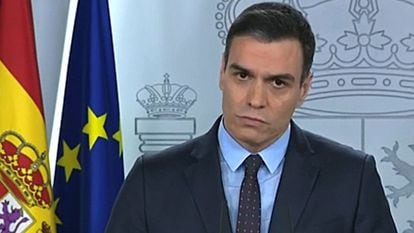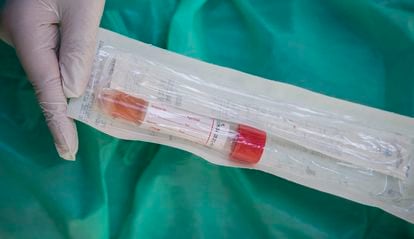In deadliest day yet, Spain registers 462 coronavirus deaths in just 24 hours
Madrid’s Palacio del Hielo ice rink could soon become a morgue for victims of Covid-19. The government expects the peak of infections to be reached this week
/cloudfront-eu-central-1.images.arcpublishing.com/prisa/VLA7PIWG5FGKPFYEUFBTQEIPTU.jpg)
The latest figures from the Spanish Health Ministry on Monday put the number of coronavirus infections in Spain at 33,089, with 2,355 patients in intensive care and 2,182 dead. The number of fatalities rose by 462 in the past 24 hours, a spike of 26.8%, making Monday the deadliest day since the coronavirus epidemic broke out in Spain.
A total of 3,355 patients with the Covid-19 disease have recovered and have been released from hospital since the crisis hit the country.
Speaking to the press on Monday, Fernando Simón, the director of the Health Ministry’s Coordination Center for Health Alerts, explained that the total number of cases in Spain had risen by 16% since Sunday.
One of the goals is to recognize the level of community transmissionFernando Simón, the director of the Health Ministry’s Coordination Center for Health Alerts
“The peak [of infections] is probably going to be reached this week,” Simón warned. “The next days are going to be crucial.”
Simón said that the percentage of patients in intensive care was gradually falling: “It has gone from 15% to 13% in recent dates. They are small reductions that give a certain amount of hope.”
The health expert also explained that, based on nearly 40% of coronavirus fatalities, 87% were over the age of 70, and 7.8% between the age of 60 and 69. “There has not been a single death among children under 10 and only one between the ages of 0 and 19,” said Simón.
On Monday, the government reported that Deputy Prime Minister Carmen Calvo had been hospitalized due to respiratory problems, and would be tested for SARS-CoV-2. Numerous Spanish politicians have already tested positive for the coronavirus, including Equality Minister Irene Montero of Unidas Podemos and Santiago Abascal, the leader of the far-right party Vox.
On Sunday, Spanish opera singer Plácido Domingo also announced on social media that he had tested positive for the coronavirus. “My family and I are and will continue to be individually isolated for the time that it is considered medically necessary,” he said in a message on Facebook.
Meanwhile, regional governments began receiving 640,000 new test kits on Monday that promise to deliver faster results and provide a more accurate picture of the true spread of a pandemic. According to Simón, the tests will be first sent to health workers and seniors living in residences and care homes.
“One of the goals is to recognize the level of community transmission,” he explained.
Ice rink becomes a morgue

Madrid’s ice rink could soon be turned into a morgue for coronavirus victims in the Spanish capital. The company that operates the Palacio de Hielo has offered the premises and Madrid authorities have greenlighted the initiative, said a spokesperson for the regional government.
It is unclear when the facility will become operational. “We are waiting for the relevant official in City Hall to give us the go-ahead,” said a source at the regional government. The army’s Emergency Military Unit (UME) would be in charge of transferring the bodies, and a protocol is being drafted to organize the logistics, said army sources.
A report drafted by regional health authorities which EL PAÍS has seen states that the Palacio del Hielo has “the necessary cold conditions to preserve the bodies,” which would be placed on “a surface made of polymer materials around two to three centimeters thick.” Coffins would be “duly identified” to prevent confusion.
Opened in 2003 on Silvano street, in the Hortaleza district, the Palacio de Hielo is located near the Ifema convention center, which has just been converted into Spain’s largest field hospital.
Also on Monday, Madrid’s municipal funerary services SFM said that they will no longer collect victims of Covid-19 due to a lack of protective gear for their own workers, said Madrid Mayor José Luis Martínez-Almeida in a letter sent to Health Minister Salvador Illa to which EL PAÍS has had access. The letter reminds the minister that “more than 150 people are dying every day” in Madrid, and requests urgent delivery of face masks and other protective gear for SFM’s employees.
Cyberattacks
The National Police has warned about a massive email campaign aimed at Spanish healthcare workers. The emails contain “a very dangerous and malicious virus” that aims to “bring down the entire computer system of Spain’s hospitals.”
At a news conference on Monday, the deputy operational director for the National Police, Jose Ángel González, also warned about other emails that are being sent out “to access our systems, infect our computers and access all our passwords and personal information.” Security experts have been warning about a global rise in the volume of Covid-19-themed cyberattacks.
More measures

On Sunday, the Spanish government said it wanted to extend the state of alarm a further 15 days until April 11, to ensure that people remain at home throughout that time. Congress will vote on the decision on Wednesday. Pablo Casado, the leader of the conservative Popular Party (PP), said on Monday that his party would support extending the state of alarm.
“The PP has decided to support the measures, even if we consider that they have come to late or are insufficient,” said Casado at a press conference.
After a week of lockdown, the government has announced even greater restrictions of the movement of people, but some regional leaders feel that Madrid is not moving fast enough on this issue. The premier of the Murcia region, Fernando López Miras, this weekend unilaterally approved greater restrictions on non-essential activities, and said he was certain that similar steps would be taken at the national level soon. But the central executive noted that such a move requires authorization by the health minister, Salvador Illa.
The minister announced on Monday that new regulations on the distribution of medicine, water quality, and hotel closures would be presented on Tuesday.
Out of the more than 4,000 Spaniards who were still stranded abroad on Friday, around 1,000 made their way back home over the weekend on commercial flights, said Foreign Minister Arancha González Laya on the state broadcaster TVE. “To those who are still waiting, I ask them not to worry, to stay calm. And to those who are residents of other countries, I ask them to stay where they are and follow the recommendations of local health authorities.”
Largest hospital
In Madrid, the epicenter of the coronavirus crisis in Spain with more than 1,000 deaths so far, the regional government has shut down the nighttime and weekend emergency services at local health centers, and sent some of those workers to the Ifema convention center, which has been turned into the country’s largest field hospital.
When the facility becomes fully operational on Tuesday, there will be 1,300 beds for conventional patients and 96 critical care units in Pavilions 5, 7 and 9. The latter two spaces, which cover 35,000 square meters, will serve as the heart of the hospital. Madrid regional authorities said that the number of beds could be increased to as much as 5,500 if necessary, the news agency Europa Press reported. Another 21,000 square meters are being turned into a warehouse, according to Juan José Pérez Blanco, who is coordinating the construction of this emergency center at a site that only recently was hosting global events such as the Fitur tourism fair.
Madrid authorities also reported that 20% of the region’s 500 senior residences, both public and private, have detected coronavirus cases. Elderly care homes have been at the heart of several outbreaks, and the deputy premier of the Madrid region, Ignacio Aguado, has asked the Defense Ministry to help these centers by sending in its own medical staff.
Experimental treatment

The need to stem the flow of Covid-19 patients to overwhelmed intensive care units, together with the empirical evidence that many patients who start out with a good prognosis experience a quick and sudden deterioration, has led Spanish hospitals to accelerate the use of experimental treatments, four medical officials at leading public hospitals have told EL PAÍS.
“It’s about getting an early start on treatment in cases with mild symptoms who are older than 60 or who have underlying health conditions,” said Olga Delgado, president of the Spanish Society of Hospital Pharmacology (SEFH). “The goal is to act before the patient develops serious symptoms, through individual assessment.”
In most cases physicians are using well-known drugs such as hydroxychloroquine, which is normally used to treat malaria and rheumatoid arthritis. Doctors are also trying a combination of the antiretrovirals lopinavir and ritonavir, which are widely used against HIV.
English version by Susana Urra and Melissa Kitson.
/cloudfront-eu-central-1.images.arcpublishing.com/prisa/GS7K242KQW263ZRFK3X22LJ73M.jpg)
/cloudfront-eu-central-1.images.arcpublishing.com/prisa/LPARCUGPA5CXZBFTPOFJV5ZKAQ.png)










































